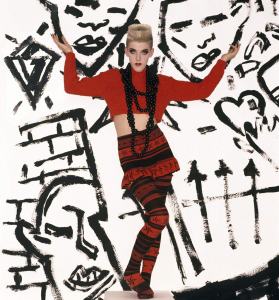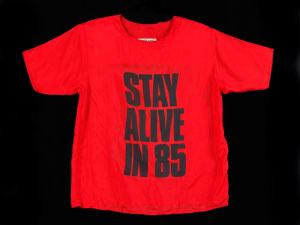Fashion in the 1980s epitomised political subversion, self-expression and a hyperactive creative energy. The fashion wasn’t really about the ‘fashion’ for its own sake, and for some designers, this ethos still holds; Vivienne Westwood’s environmentally-focused show last week (15 September) at London Fashion Week was chiefly about the message – the word ‘CLIMATE’ was printed ostentatiously across the pieces, and Lily Cole, the poster-child for fashion-with-a-conscience, opened the show with an interpretive dance, awash with red light, a nature-child drenched in blood. After the show Westwood implored people, ‘don’t invest in fashion – invest in the world’.
But there is something lacklustre now, perhaps even mainstream, about the fashion industry’s occasional anti-establishment pseudo-subversive acts. Even the Daily Mail praised Westwood and Cole’s social responsibility, lauding Cole – albeit in a patronising way – for ‘proving again that she is more than just a model’. This is what makes current shows such as the V&A’s ‘Club to Catwalk: London Fashion in the 1980s’, and the ICA’s off-site ‘A Journey Through London Subculture: 1980s to Now’, simultaneously so engaging and so disturbing.

Cat in the hat takes a rumble with a techno fish (1985), A/W 1984 Bodymap. Model: Scarlett Cannon © 1985 Monica Curtin.
Both shows seem to share the same aspiration – to translate the unique energy of the 1980s for those born just on the wrong side of that illustrious decade, and to revive some of the spirit in those who experienced 1980s subculture first-hand. Most of the pieces have retained an aura of boundless energy and individuality, and continue to resonate. Christopher Nemeth’s iconic 1986 Post Office sacking jacket made two noticeable appearances – on a display mannequin in the V&A, and on a guest at the opening party of ‘A Journey Through Subculture’.
Katharine Hamnett’s bold ‘statement’ t-shirts, also on display at the V&A, bear slogans that are unfortunately still relevant now – ‘No More Fashion Victims’ could easily refer to the tragic collapse of the Rana Plaza garment factory in Bangladesh. Although in many ways unique to the 1980s, it is unsurprising that these designs continued to pervade fashion in later decades. Henry Holland’s 2006 Fashion Groupie t-shirt series was just one of many later appropriations of Hamnett’s style – although these called less for environmental and social responsibility, and more for Giles Deacon to Get His Freak On.

Silk t-shirt (1984), designed by Katharine Hamnett © Victoria and Albert Museum, London
However, these shows are so laden with nostalgia that their initial energy gives way to melancholy. This is partly due to the meticulously ordered display of a culture that thrived on chaos. The V&A organises 1980s fashion subcultures into neat sections, including ‘Glam Fetish’, ‘Hard Times’ and ‘Goth’, with carefully selected quotes about fashion enabling self-expression, design as ‘anarchical and perverse’ (courtesy of the ubiquitous Westwood) and vague references to ecstasy-fuelled happenings – descriptions of disorder and fun that are at odds with the display. The ICA has gone one step further, containing their exhibits in vitrines so that viewing them recalls peering into open-casket coffins.
This is the most poignant thing: by presenting themselves as homage, these shows unconsciously affirm that the zeitgeist of 1980s subculture is truly dead – in part due to the fact that these once subversive fashions have become normalised. Even the mainstream conservative media gives Vivienne Westwood its nod of approval. And the most shocking thing to have emerged from any of these designers since the 1980s has been strategically ignored; that is, the brutal xenophobia spewed by John Galliano.
This inflects the S/S 1986 collection ‘Fallen Angels’, included in ‘Club to Catwalk’, with more than a little irony, and an invitation for Galliano’s S/S 1985 show, featuring an orientalist depiction of a menacing generic-Arab with the caption ‘AFGHANISTAN REPUDIATES WESTERN IDEALS’, is politely tucked into a corner at the Old Selfridges Hotel without remark. This non-recognition, although somewhat understandable in shows centred on ‘carefree fun’, is what ultimately establishes them as homage – or even as pop-culture hagiography. Instead, inspirational text about Galliano making ostentatious club outfits peppers the V&A’s wall text. One must not speak ill of a dead decade.
The ICA’s ‘A Journey Through London Subculture: 1980s to Now’ is at the Old Selfridges Hotel until 20 October 2013.
‘Club to Catwalk: London Fashion in the 1980s’ is at the Victoria and Albert Museum until 16 February 2014.

Lost Decade
Cat in the hat takes a rumble with a techno fish (1985), A/W 1984 Bodymap Model: Scarlett Cannon © 1985 Monica Curtin
Share
Fashion in the 1980s epitomised political subversion, self-expression and a hyperactive creative energy. The fashion wasn’t really about the ‘fashion’ for its own sake, and for some designers, this ethos still holds; Vivienne Westwood’s environmentally-focused show last week (15 September) at London Fashion Week was chiefly about the message – the word ‘CLIMATE’ was printed ostentatiously across the pieces, and Lily Cole, the poster-child for fashion-with-a-conscience, opened the show with an interpretive dance, awash with red light, a nature-child drenched in blood. After the show Westwood implored people, ‘don’t invest in fashion – invest in the world’.
But there is something lacklustre now, perhaps even mainstream, about the fashion industry’s occasional anti-establishment pseudo-subversive acts. Even the Daily Mail praised Westwood and Cole’s social responsibility, lauding Cole – albeit in a patronising way – for ‘proving again that she is more than just a model’. This is what makes current shows such as the V&A’s ‘Club to Catwalk: London Fashion in the 1980s’, and the ICA’s off-site ‘A Journey Through London Subculture: 1980s to Now’, simultaneously so engaging and so disturbing.
Cat in the hat takes a rumble with a techno fish (1985), A/W 1984 Bodymap. Model: Scarlett Cannon © 1985 Monica Curtin.
Both shows seem to share the same aspiration – to translate the unique energy of the 1980s for those born just on the wrong side of that illustrious decade, and to revive some of the spirit in those who experienced 1980s subculture first-hand. Most of the pieces have retained an aura of boundless energy and individuality, and continue to resonate. Christopher Nemeth’s iconic 1986 Post Office sacking jacket made two noticeable appearances – on a display mannequin in the V&A, and on a guest at the opening party of ‘A Journey Through Subculture’.
Katharine Hamnett’s bold ‘statement’ t-shirts, also on display at the V&A, bear slogans that are unfortunately still relevant now – ‘No More Fashion Victims’ could easily refer to the tragic collapse of the Rana Plaza garment factory in Bangladesh. Although in many ways unique to the 1980s, it is unsurprising that these designs continued to pervade fashion in later decades. Henry Holland’s 2006 Fashion Groupie t-shirt series was just one of many later appropriations of Hamnett’s style – although these called less for environmental and social responsibility, and more for Giles Deacon to Get His Freak On.
Silk t-shirt (1984), designed by Katharine Hamnett © Victoria and Albert Museum, London
However, these shows are so laden with nostalgia that their initial energy gives way to melancholy. This is partly due to the meticulously ordered display of a culture that thrived on chaos. The V&A organises 1980s fashion subcultures into neat sections, including ‘Glam Fetish’, ‘Hard Times’ and ‘Goth’, with carefully selected quotes about fashion enabling self-expression, design as ‘anarchical and perverse’ (courtesy of the ubiquitous Westwood) and vague references to ecstasy-fuelled happenings – descriptions of disorder and fun that are at odds with the display. The ICA has gone one step further, containing their exhibits in vitrines so that viewing them recalls peering into open-casket coffins.
This is the most poignant thing: by presenting themselves as homage, these shows unconsciously affirm that the zeitgeist of 1980s subculture is truly dead – in part due to the fact that these once subversive fashions have become normalised. Even the mainstream conservative media gives Vivienne Westwood its nod of approval. And the most shocking thing to have emerged from any of these designers since the 1980s has been strategically ignored; that is, the brutal xenophobia spewed by John Galliano.
This inflects the S/S 1986 collection ‘Fallen Angels’, included in ‘Club to Catwalk’, with more than a little irony, and an invitation for Galliano’s S/S 1985 show, featuring an orientalist depiction of a menacing generic-Arab with the caption ‘AFGHANISTAN REPUDIATES WESTERN IDEALS’, is politely tucked into a corner at the Old Selfridges Hotel without remark. This non-recognition, although somewhat understandable in shows centred on ‘carefree fun’, is what ultimately establishes them as homage – or even as pop-culture hagiography. Instead, inspirational text about Galliano making ostentatious club outfits peppers the V&A’s wall text. One must not speak ill of a dead decade.
The ICA’s ‘A Journey Through London Subculture: 1980s to Now’ is at the Old Selfridges Hotel until 20 October 2013.
‘Club to Catwalk: London Fashion in the 1980s’ is at the Victoria and Albert Museum until 16 February 2014.
Share
Recommended for you
First Look: Magritte at MoMA
Anne Umland, curator of ‘Magritte: The Mystery of the Ordinary, 1926–1938’ at MoMA speaks to Apollo
Rejected Riches: Avenue House
The sale of Sir Albert Richardson’s collection is a loss for the nation that could and should have been averted
Jordaens: Ardent Artifice
Jordaens has languished in the shadow of Rubens and Van Dyck, but an exhibition at the Petit Palais brings the artist back into the spotlight